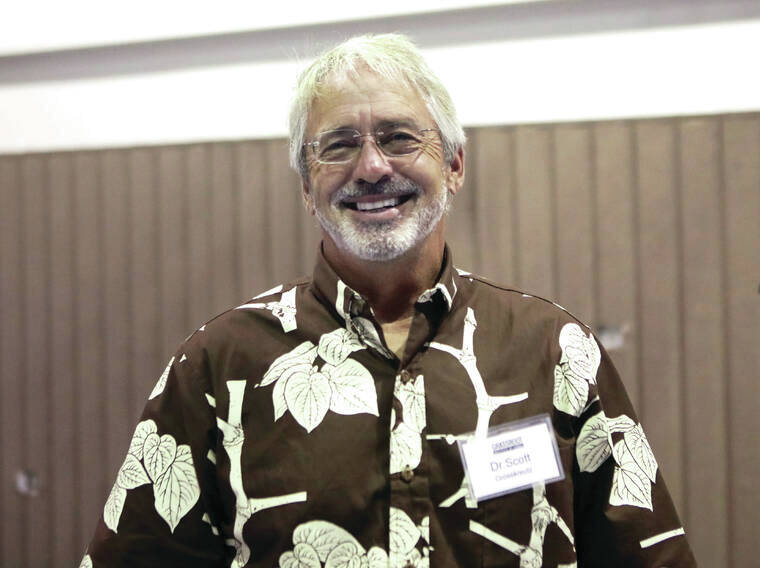A petition urging the state Legislature to exempt medical services from the state’s general excise tax, or GET, has collected more than 1,100 signatures, according to Joe Kent, vice president of the Grassroot Institute of Hawaii.
“It was more difficult to drum up signatures during the election season since people were distracted,” Kent told the Tribune-Herald last week. “We’ll keep the petition going.”
The nonprofit policy research organization plans to give the petition to state lawmakers and the incoming governor’s administration, Kent said.
“Lawmakers could exempt the GET on medical services, which would save doctors and their patients $200 million, and the state would still have a $2 billion surplus,” he said. “There’s plenty of wiggle room for a tax cut.”
For the 2023 fiscal year, the state expects a surplus of $2 billion, with $831 million in additional reserves, according to Gov. David Ige’s administration.
“That surplus is projected to grow to $10 billion by (Fiscal Year) 2027,” Kent said. “Keep in mind that these are abnormally high surpluses.”
Scott Grosskreutz, who leads the Hawaii Provider Shortage Crisis Task Force, said the elimination of the GET — which currently is 4.7120% in Hawaii County — on medical services could improve employment shortages and benefit patients and health care providers.
“The whole country is short of health care providers, and the last thing you want to do is try and discourage people from coming here by using these unique taxation models that really aren’t sustainable,” he said. “It doesn’t make any sense for Hawaii to be the only state in America that basically has punitive taxation on people taking care of Medicare, Medicaid and TRICARE patients.”
The GET disproportionately impacts private practice providers, because hospitals are already exempt. If fewer private providers come to Hawaii, Grosskreutz estimates revenue from the GET would drop over time.
“As the number of people in private practice get pushed out, it’s already below 50% for the state, but as they have to quit, or retire, and no one comes to take them over, you’ll have fewer and fewer people in private practice being taxed,” he said. “In the long run, maybe in as little as three to five years, there will be little revenue from taxing health care, because you won’t have any people in private practice left to tax.”
Grosskreutz said the benefits of a GET exemption also extend to patients.
“A lot of times, you’ve got private insurance where it’s the patient that pays the tax because the health care provider or hospital passes it on,” he said. “And if you’re already staggering under large medical bills, because you have cancer or need heart surgery, the last thing you can afford to do is pay the state tens of thousands of extra dollars in GET taxation.”
To improve the challenges of rural health care, the University of Hawaii Rural Health Research and Policy Center recently received a $1 million grant from the U.S. Department of Health and Human Services.
“We want to create actionable, evidence-based policy briefs that can help to inform policymakers about strategies to improve rural health in Hawaii,” said Aimee Malia Grace, who serves as principal investigator of the group. “We are certainly open to doing further research and policy analysis on the GET solution, but it is not one of our top federal priorities to start.”
Instead, the Policy Center is focusing on Medicare reimbursement rates, or funds given to providers serving Medicare patients, to alleviate the physician shortage.
“We are looking at prioritizing Medicare reimbursement rates and studying the health economic impacts of the rates that we have, and why we may need to advocate that they should be changed,” Grace said.
“The economic reality is the cost of providing medical care in Hawaii is often higher than what the reimbursements are,” said Grosskreutz. “When you have these very high costs in the state of Hawaii, and then very low reimbursements, and then on top of that you have the state taxing you on your patients care, it basically guarantees that if you’re a breaking-even providing services, you’re going to lose money, and if you were losing money before, you’re going to lose even more money.”
Big Island physician Josh Green, who was elected governor earlier this month, has spoken in favor of reforming the GET for medical services, opting to replace the lost revenue with a proposed $50 “climate impact fee” on all incoming tourists 12 and older. With roughly 7 million to 8 million tourists annually, Green estimates the fee could raise roughly $350 million per year.
While the petition addresses the GET, both Grace and Grosskreutz believe the long-term solution also will include addressing reimbursement rates.
“The lifeline being thrown out to the drowning swimmer right now is getting the GET exemption for private practice health care,” said Grosskreutz. “That will help, but in the long run, unless reimbursements go up, it’s still going to be a grim prognosis.”
The Grassroot Institute petition can be viewed here: https://tinyurl.com/45ny9jtp.
Email Grant Phillips at gphillips@hawaiitribune-herald.com.









